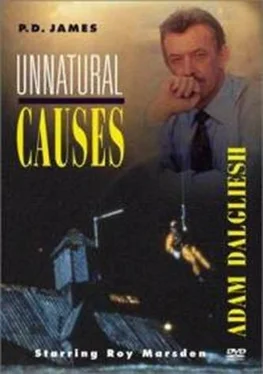P James - Unnatural Causes
Здесь есть возможность читать онлайн «P James - Unnatural Causes» весь текст электронной книги совершенно бесплатно (целиком полную версию без сокращений). В некоторых случаях можно слушать аудио, скачать через торрент в формате fb2 и присутствует краткое содержание. Жанр: Детектив, на английском языке. Описание произведения, (предисловие) а так же отзывы посетителей доступны на портале библиотеки ЛибКат.
- Название:Unnatural Causes
- Автор:
- Жанр:
- Год:неизвестен
- ISBN:нет данных
- Рейтинг книги:4 / 5. Голосов: 1
-
Избранное:Добавить в избранное
- Отзывы:
-
Ваша оценка:
- 80
- 1
- 2
- 3
- 4
- 5
Unnatural Causes: краткое содержание, описание и аннотация
Предлагаем к чтению аннотацию, описание, краткое содержание или предисловие (зависит от того, что написал сам автор книги «Unnatural Causes»). Если вы не нашли необходимую информацию о книге — напишите в комментариях, мы постараемся отыскать её.
Unnatural Causes — читать онлайн бесплатно полную книгу (весь текст) целиком
Ниже представлен текст книги, разбитый по страницам. Система сохранения места последней прочитанной страницы, позволяет с удобством читать онлайн бесплатно книгу «Unnatural Causes», без необходимости каждый раз заново искать на чём Вы остановились. Поставьте закладку, и сможете в любой момент перейти на страницу, на которой закончили чтение.
Интервал:
Закладка:
He wriggled his arms into his dressing gown and walked across to the window. Outside the morning was calm and bright, bringing an immediate memory of the first day of his holiday. For a moment the fury of the night seemed as remote and legendary as any of the great storms of the past. But the evidence was before him. The tip of headland visible from his eastward window was ravaged and raw as if an army had clumped across it littering its way with torn boughs and uprooted gorse. And, although the wind had died to a breeze so that the litter of the headland scarcely stirred, the sea was still turbulent, slopping in great sluggish waves to the horizon as if weighted with sand. It was the colour of mud, too turbid and violent to reflect the blue translucence of the sky. Nature was at odds with itself, the sea in the last throes of a private war, the land lying exhausted under a benign sky.
He turned from the window and looked round the room as if seeing it for the first time. There was a folded blanket across the back of the easy chair by the window and a pillow resting on the arm. His aunt must have spent the night sleeping there. It could hardly have been because of concern for him. He remembered now. They had brought Latham back to Pentlands with them; his aunt must have given up her room. The realisation irritated him and he wondered whether he was being petty enough to resent his aunt’s concern for a man he had never liked. Well, what of it? The dislike was mutual if that were any justification and the day threatened to be traumatic enough without beginning it in a mood of morbid self-criticism. But he could have done without Latham. The events of the night were too raw in the memory to relish the prospect of exchanging small talk over breakfast with his partner in folly.
As he made his way downstairs he could hear a murmur of voices from the kitchen. There was the familiar morning smell of coffee and bacon but the sitting room was empty. His aunt and Latham must be breakfasting together in the S kitchen. He could hear Latham’s high arrogant voice more clearly now although his aunt’s softer replies were inaudible. He found himself treading softly so that they might not hear him, tiptoeing across the sitting room like an intruder. Soon, inevitably, he would have to face Latham’s excuses and explanations, even-horrible thought-his gratitude. Before long the whole of Monksmere would arrive to question, argue, discuss and exclaim. Little of the story would be news to him, and he had long outgrown the satisfaction of being proved right. He had known who for a long time now and since Monday night he had known how. But to the suspects the day would bring a gratifying vindication and they could be expected to make the most of it. They had been frightened, inconvenienced and humiliated. It would be churlish to grudge them their fun. But for the moment he trod warily, as if reluctant to waken the day.
There was a small fire burning in the sitting room, its thin flame flickering wanly in the brightness of the sun. He saw that it was after eleven o’clock and the post had already arrived. There was a letter for him propped on the mantelpiece. Even across the room he could recognise Deborah’s large sloping handwriting. He felt in his dressing-gown pocket for his own unposted letter to her, and with difficulty propped it up beside that other envelope, his small and upright hand looking obsessionally neat beside her generous scrawl. Hers was a thin envelope. That meant one page at the most. Suddenly he knew just what Deborah could have written on no more than one quarto page and the letter became infected with the menace of the day, opening it a chore which could reasonably be postponed. As he stood there angry at his own indecision and trying to force himself to that one simple action, he heard the approaching car. So they were coming already, avid no doubt with curiosity and pleasurable anticipation. But when the car drew nearer he recognised the Ford which Reckless used and, moving to the window, could see that the Inspector was alone.
A minute later the car door slammed and Reckless paused, as if bracing himself to approach the cottage. Under his arm he carried Celia Calthrop’s tape recorder. The day had begun.
Five minutes later the four of them listened together to the murderer’s confession. Reckless sat beside the tape recorder frowning at it constantly with the anxious, slightly peeved look of a man who expects it at any moment to break down. Jane Dalgliesh sat in her usual chair on the left of the fire, motionless, hands folded in her lap, listening as intently as if to music. Latham displayed himself against the wall, one arm drooping from the chimney piece, his bandaged head resting against the grey stones. He looked, thought Dalgliesh, like a slightly passé actor posing for a publicity photograph. He himself sat opposite his aunt balancing a tray on his knees, spearing with a fork the small cubes of buttered toast which she had prepared for him or cupping his hands, comfortably insulated, round a steaming beaker of coffee.
The voice of the dead girl spoke to them, not with the familiar irritating submissiveness, but clear, confident and controlled. Only from time to time was there a trace of excitement quickly restrained. This was her paean of triumph, yet she told her dreadful story with the assurance and detachment of a professional broadcaster reading a book at bedtime.
“This is the fourth time I’ve dictated my confession and it won’t be the last. The tape can be used over and over again. One can always improve. Nothing need be final. Maurice Seton used to say that, working away at his pathetic books as if they were worth writing, as if anyone cared what word he used. And as likely as not it would be my word in the end, my suggestion, breathed oh so tentatively and quietly so that he wouldn’t notice that it was a human being who spoke. I wasn’t ever that to him. Just a machine who could take shorthand, type, mend his clothes, wash up, even do a little cooking. Not a really efficient machine, of course, I hadn’t the use of my legs. But that made it easier for him in some ways. It meant that he didn’t even have to think of me as female. He never saw me as a woman, of course. That was to be expected. But after a time I wasn’t even female. I could be asked to work late, stay the night, share his bathroom. No one would talk. No one would care. There was never any scandal. Why should there be? Who would want to touch me? Oh, he was safe enough with me in the house. And, God knows, I was safe enough with him.
“He would have laughed if I had told him that I could make him a good wife. No, not laughed. He would have been disgusted. It would have seemed like mating with a halfwit, or an animal. Why should deformity be disgusting? Oh, he wasn’t the only one. I’ve seen that look in other faces. Adam Dalgliesh. Why should I instance him? He can hardly bear to look at me. It’s as if he’s saying, ‘I like women to be lovely. I like women to be graceful. I’m sorry for you but you offend me.’ I offend myself, Superintendent. I offend myself. But I mustn’t waste tape on preliminaries. My first confessions were too long, imperfectly balanced. By the end they even bored me. But there will be time to get the story right, to tell it perfectly so that I can play the tape over and over for the rest of my life and yet feel the first keen pleasure. Then, perhaps, one day I shall clean it all away. But not yet. Perhaps never. It would be amusing to leave it for posterity. The only drawback to planning and carrying out a perfect murder is that no one else can appreciate it. I may as well have the satisfaction, however childish, of knowing that I shall make the headlines after my death.
“It was a complicated plot, of course, but that made it all the more satisfying. After all, there is nothing difficult about killing a man. Hundreds of people do it every year and have their brief moment of notoriety before they are as forgotten as yesterday’s news. I could have killed Maurice Seton any day I chose, especially after I got my hands on those five grains of white arsenic. He took them from the Cadaver Club museum, substituting a bottle of baking powder, at the time he was writing One for the Pot . Poor Maurice, he was obsessed by this urge for verisimilitude. He couldn’t even write about an arsenical poisoning without handling the stuff, smelling it, seeing how quickly it would dissolve, enjoying the thrill of playing with death. This absorption in detail, this craving for vicarious experience, was central to my plot. It led him, the predestined victim, to Lily Coombs and the Cortez Club. It led him to his murderer. He was an expert in vicarious death. I should like to have been there to see how he enjoyed the real thing. He meant to put the stuff back, of course; it was only borrowed. But before he could do so I did some substituting of my own. The baking powder in the showcase at the club was replaced by Maurice with baking powder-again. I thought that the arsenic might come in handy. And it will. It will shortly come in very handy indeed. There will be no problem for me in putting it into that flask which Digby always carries. And then what? Wait for the inevitable moment when he is alone and can’t face the next minute without a drink? Or tell him that Eliza Marley has discovered something about Maurice’s death and wants to meet him secretly far along the beach? Any method will do. The end will be the same. And once he is dead, what can anyone prove? After a little time I shall ask to see Inspector Reckless and tell him that Digby has been complaining recently about indigestion and that I have seen him at Maurice’s medicine chest. I shall explain how Maurice borrowed some arsenic once from the Cadaver Club but he assured me that he had replaced it. But suppose he didn’t? Suppose he couldn’t bring himself to part with it? That would be typical of Maurice. Everyone will say so. Everyone will know about One for the Pot . The powder in the museum showcase will be tested and found to be harmless. And Digby Seton will have died by a tragic accident but through his half-brother’s fault. I find that very satisfying. It is a pity that Digby, who despite his stupidity has been very appreciative of so many of my ideas, has to be kept ignorant of this final part of the plan.
Читать дальшеИнтервал:
Закладка:
Похожие книги на «Unnatural Causes»
Представляем Вашему вниманию похожие книги на «Unnatural Causes» списком для выбора. Мы отобрали схожую по названию и смыслу литературу в надежде предоставить читателям больше вариантов отыскать новые, интересные, ещё непрочитанные произведения.
Обсуждение, отзывы о книге «Unnatural Causes» и просто собственные мнения читателей. Оставьте ваши комментарии, напишите, что Вы думаете о произведении, его смысле или главных героях. Укажите что конкретно понравилось, а что нет, и почему Вы так считаете.












